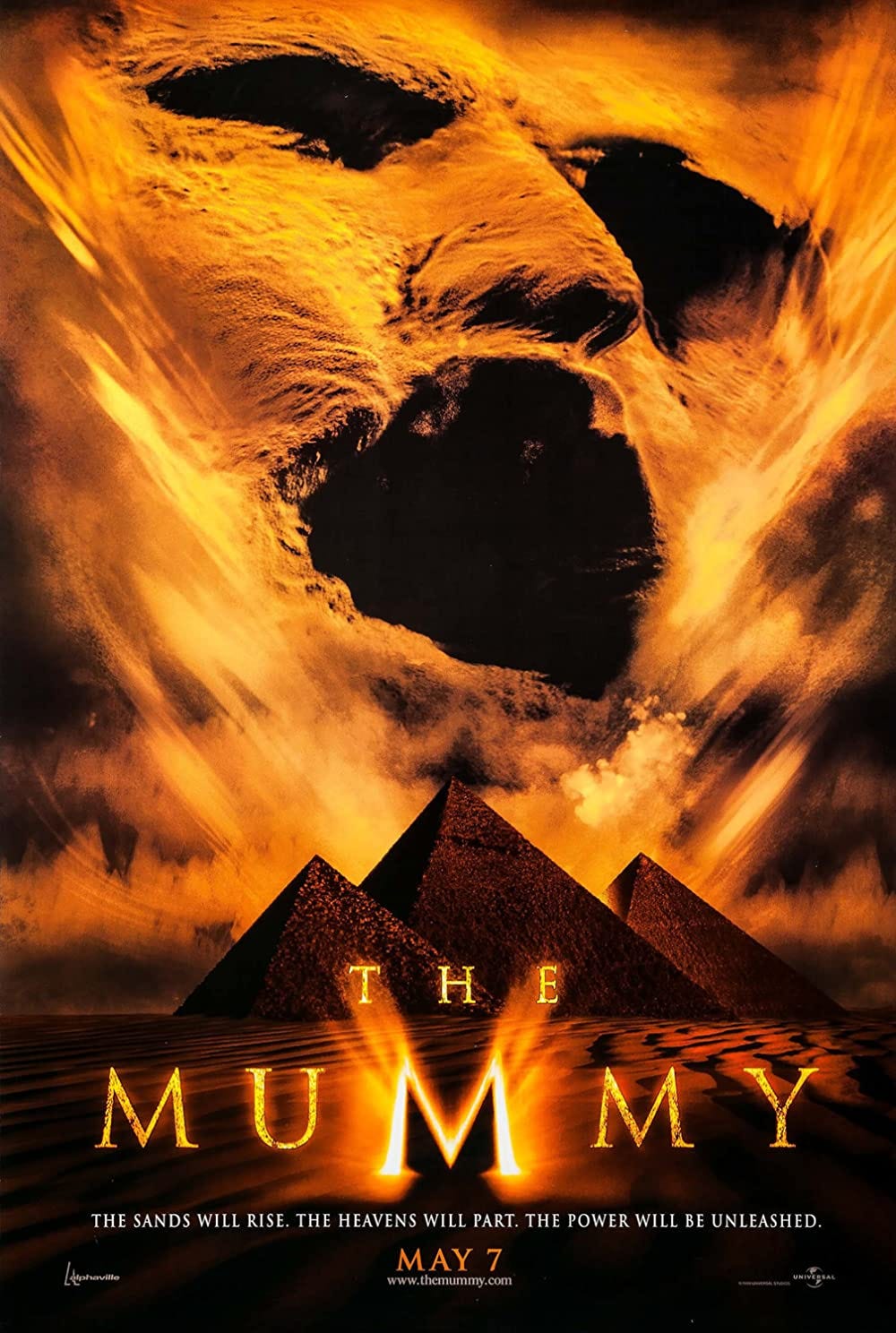Brendan Fraser is a Hero, and I Don’t Just Mean in The Mummy (1999)
Hey folks! Jeremy here. Welcome to Mummy Month over at Dust On The VCR! Throughout the month of January, I’m leaning into my curiosity about The Mummy’s exalted status among people younger than me by featuring four guest writers who all truly love this film. First up is Audi Barnes, a fellow copywriter of mine at my/our new workplace and an extremely talented writer in all facets, particularly in poetry. She has this bumper sticker on her car. Also, this exeperiment was sort of inspired by her love of The Mummy, so if you enjoy what we’re doing here, you have her to thank! Okay, here’s Audi.
The image of a hunky man braving the harsh sands to save the damsel in distress with his pistol and characteristic one-liners conjures a specific image. For some, it’s Clint Eastwood in The Good, The Bad, and The Ugly. For many, it’s Harrison Ford’s adventurer extraordinaire Indiana Jones. But for a select and fervent few, no one embodies this archetype better than Brendan Fraser’s Rick O’Connell of The Mummy.
I can’t remember which came first: my Ancient Egypt Phase or my initial viewing of The Mummy. Did this movie spark my love of Egyptian mythos, or did it fan the flames of my childish devotion to all things Tutankhamen? Though I can’t be certain of the order of events, the two have walked hand in hand ever since.
My love for action movies featuring hot, sandswept locales and protagonists in practical yet stylish garb has only grown ever since. In fact, my desire to recreate the feelings of romantic wonder and low-stakes action that The Mummy evoked in me is a strong part of the reason why I rewatch films like Sahara, Stargate, and Hidalgo when I’m feeling nostalgic.
“Supernatural desert adventure” seems like a highly specific niche to venerate, but stick with me here. These quasi-historical, fantastical tales scratched the cinema itch in a way that just can’t be quantified. Since Indy juuuuuust squeezed by younger millennials and Gen Z in terms of interest and relevance, this void simply needed to be filled by a fresh—but still sentimental—desert adventure.
“Needed” may seem a strong word here, but it’s not unwarranted. Why? Because of Rick Riordan’s historical fantasy books. If you were a bookworm under the age of 15 in 2005, this name summons a feeling of comfort you may not have otherwise associated with the time, and that’s thanks to the release of Riordan’s Percy Jackson and the Olympians book series. In these books, the titular character learns he is the demigod son of the Greek god Poseidon and he must defend himself and the people he loves against a horde of mythological monsters.*
After the success of the wildly popular series and Riordan’s staunch commitment to including characters from diverse races, socioeconomic backgrounds, genders, and sexual orientations, fans of Riordan’s work were thrilled to hear that Percy Jackson had secured a film adaptation…and then the film was as faithful to the source text as a cracked and cloudy mirror.** We’d been so close, this close, to having a cultural/historical mythos with fantasy elements depicted on screen with all the nostalgia fans of the original series could summon from their middle-grade era, but it was simply for naught.
So why did The Mummy fill the void for diverse, whimsical, and original mainstream cinema some 20 years later? Why did the dated CGI, the clichéd jokes, even the corny dialogue resonate with this age group? The answer may seem pretty shitty, but I find it somewhat hopeful: Brendan Fraser came forward with his sexual assault.
In a 2018 interview with GQ discussing the disappearance and return of the 90s leading man, Fraser’s discussion of his assault 15 years prior takes on a confessional tone. He said he once believed he deserved his 2003 run-in with Philip Berk, former president of the Hollywood Foreign Press Association— a familiar refrain to those who share a similar experience. This tower of a man who once played roles as the quintessential action hero with rogueish charm and a heart of gold had become vulnerable and sensitive. Traits that underlaid many of the characters he played, and which resonated with women across the globe, had become Fraser’s lived experience at a massive cost to his mental health.
Fraser embodies the rare middle-aged white man whose quiet manner and unsensational commitment to his craft has been missing as a celebrity role model. When you spend your days asking and hoping for the bare minimum of decency, it’s incredibly superlative when you actually stumble upon a Nice White Dude. This, coupled with a generation that became adults during the #MeToo movement, resulted in the best possible environment for Fraser to be welcomed back to the public eye.***
Fans were overwhelmingly supportive of Fraser in the wake of the GQ interview to the point that he began trending on Twitter. It put his past work, namely The Mummy, back on social media, where it was snapped up immediately. The Mummy—not a sequel, not a franchise, not a recent-memory-reboot—captured this audience with its earnest love of action/adventure tropes and desert romance. With Rachel Weisz’s depiction of Evy Carnahan as a whip-smart librarian who grows from ingenue to adventurer balancing Fraser’s swashbuckling yet sensitive hero, The Mummy thawed the frozen heart of moviegoers tired of the reheated cinema permeating our current era of media. Though I’ve undoubtedly skewed the algorithm, I still regularly see Mummy content on my TikTok, and it resurfaces occasionally with Fraser’s new roles.
And of course, The Mummy is just flat-out visually appealing. And I don’t mean the sweeping landscapes afforded by production filming on location in the Sahara—I’ll admit to objectifying every character in this movie and do my Hail Marys at a later date. It is the very definition of bi panic, which has an unsurprisingly strong effect on this age group as we proudly carry the mantle of likely being the queerest generation on record.
There’s probably something in there I should examine about movies that romanticize white saviorism in desert locales, but therapy is expensive, and my love of Brendan Fraser has somehow managed to cancel out any reticence I have in worshipping at the altar of The Mummy. I genuinely believe he’s just a kind person at heart.
I’ve been trying to unlearn my knee-jerk fanaticism toward celebrities, and I regularly audit my social media to ensure that my mindless swiping isn’t just through a series of celebrity endorsements and ads. I’m not saying this to be supercilious; I’m saying this to show I don’t stan celebrities—I remember where the term came from. I could go on about how Brendan Fraser is the original himbo king, but I don’t need to convince you. Brendan Fraser is one of very few celebrities intimately authentic in his daily life.****
Occasionally I catch myself wondering what his career might have been if his trajectory hadn’t been altered in 2003, and I have to stop myself and remember that neither of those people—who he was prior to 2003 and who he might have been after—are who he is now. And who he is now is a great actor and a good dude.
Though the sentiment has been trotted out time and again since he’s come forward, I truly hope that Brendan Fraser is having a good day. He deserves it.
*You may recall my Ancient Egypt Phase from 400 words ago; I can say with full certainty that PJATO spawned my Ancient Greece Era.
**Riordan himself admitted the adaptation fell significantly short, and he recently announced plans to bring the original series to the small screen. Even Percy Jackson himself, Logan Lerman, was excited by the news.
***Mind you, this is not to say that Fraser’s roles are all squeaky clean. Ever seen Bedazzled?
****If you haven’t read that GQ article, I highly recommend it. He just wants to care for his horses, let some arrows fly, and act.
The Mummy is now streaming on HBO Max, and it’s available to rent elsewhere.






